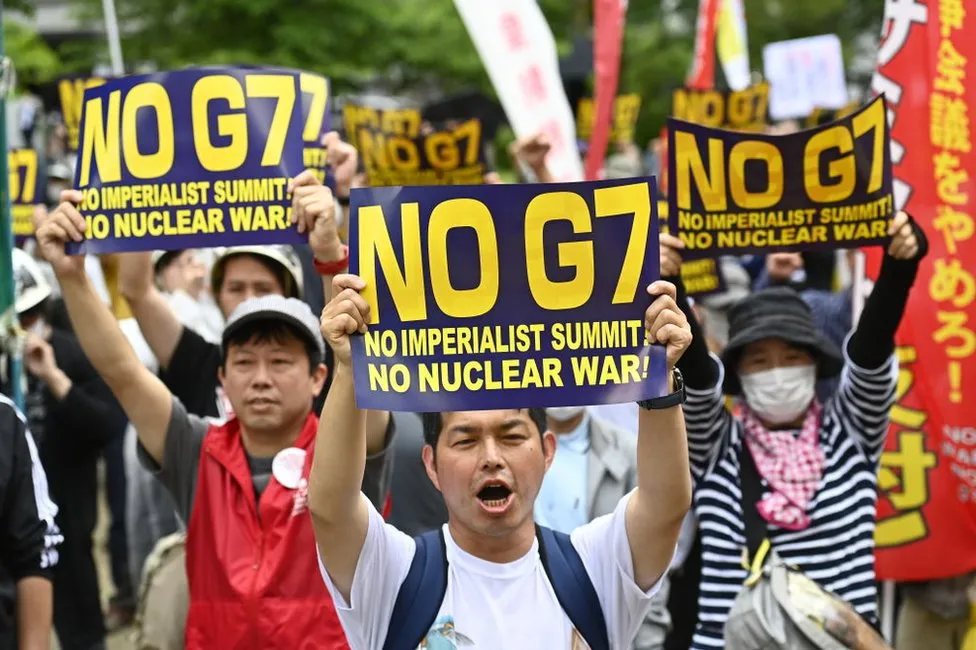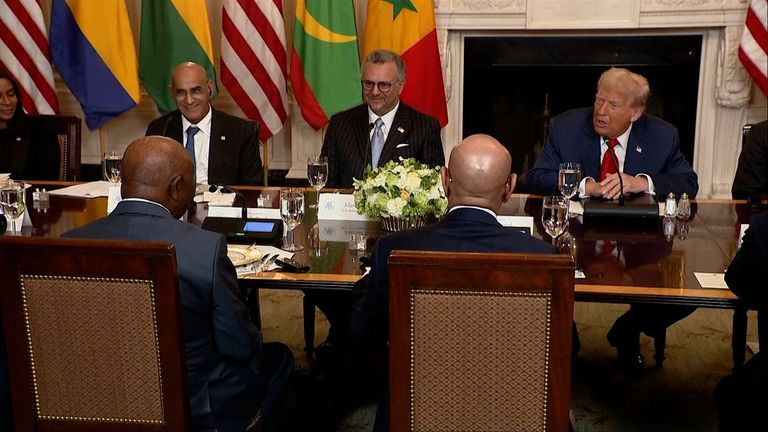Japan's pacifism hangs in balance as China and North Korea threats loom
Toshiyuki Mimaki says he remembers crying as he looked up at a blackened sunset after the nuclear bomb hit Hiroshima.

He was only three years old at the time, but he remembers the dazed and burnt survivors fleeing past his home in the countryside. He remembers heading into the city with his family, searching for his father in an apocalyptic wasteland.
Over the years he has recounted these fragmented but vivid memories to school children, to journalists, to anyone seeking to document the trauma of the hibakusha, or the atom bomb survivors. These days, they are a small and dwindling group.
"There are only a few people like us who experienced the war and the atomic bombing. We are dying," Mr Mimaki says, while sitting in Hiroshima's Peace Memorial Park, where world leaders attending the G7 summit laid wreaths on Friday.
"Sooner or later, there will not be a single hibakusha. How will Japan change by then?"
It's a fear that echoes through Japan. The world around them has changed. Japan itself has aged and its post-war miracle economy has sputtered, dwarfed by China's market and might. An anxious Japanese public now wants greater protection from new threats knocking at their door.
The governing Liberal Democrat Party (LDP), whose hands have long been tied behind its back by voters averse to militarisation, suddenly finds the knots loosening. Prime Minister Fumio Kishida's government is embarking on the biggest military spending spree in decades, and seeks to expand its armed forces.
Each move to militarise leaves Japan more divided over its pacifist ideals.
"The world is going through a period of turmoil right now," Mr Mimaki says. "Recently, Prime Minister Kishida started talking about raising the military budget. I thought: Are you going to start a war?'"
Brought to its knees by the use of atomic bombs against Hiroshima and Nagasaki, Japan transformed from an imperialist power into a pacifist nation in a matter of years.
Its post-war constitution, adopted in 1947 and imposed by occupying US forces, cemented this transformation. It contains a clause known as Article 9: the first paragraph renounces war, while the second promises to never maintain military forces.
The genesis of Japan's pacifism, Article 9 is at the heart of the country's struggle to balance the need for defence with its desire for peace. Some believe the law has weakened Japan, but others argue that to change it is to relinquish pacifism and forget the painful lessons of history.
Faced with significant public opposition, numerous leaders have tried and failed to revise Article 9. But with every security challenge, Japan's government has succeeded in expanding its interpretation further.
The Self-Defense Forces (SDF), Japan's answer to a military, were created in response to the Korean War and the start of the Cold War. In the 1990s, during the first Gulf War, Japan sent the SDF on peacekeeping missions, dispatching its forces to overseas conflicts for the first time. More recently and controversially, in the face of a rising China and unpredictable North Korea, the late prime minister Shinzo Abe pushed through laws that allowed Japanese troops to fight overseas alongside allies in self-defence.
"Pacifism is an idée fixe of the Japanese public… they are not going to abandon it," says James D Brown, an associate professor of political science with Temple University Japan.
"Instead, there is a process of reinterpreting what pacifism means. Where once it meant opposition to the use of armed force, it now means opposition to aggression and acceptance of the use of force in the name of self-defence in a growing list of circumstances."
Japan is once again at a turning point, facing unprecedented challenges that have stoked a fear of encirclement.
An assertive China is spending billions on its military. It has made increasingly daring moves in the South China Sea, especially against Taiwan, which sits on the doorstep of Japan's southernmost islands. This has fuelled Japanese anxiety that should conflict break out in Taiwan, Japan would not only be pulled into a war between the US and China, but also targeted as an ally. It hosts US military bases and has the biggest concentration of troops outside America.
North Korea poses a perennial existential threat. Its nuclear ambitions have grown more alarming in the past year, with a record number of missile launches, including several that have flown over Japan. Russia's invasion of Ukraine and the possibility that it might use nuclear weapons - which this weekend's G7 summit is addressing - has also spurred worries of a nuclear war. The perils of a tighter Moscow-Beijing alliance also loom.
"There is a general understanding in Japan that we are now living in a very rough neighbourhood," says Kazuto Suzuki, an international security and political science professor with the University of Tokyo.
Calls for greater militarisation have long been the domain of a minority of conservatives seeking to reclaim national pride. But recent polls show the wider public warming to the idea.
More people now want a bigger and stronger SDF, from 29% in 2018 to 41.5% last year, according to government surveys. Support for Japan's security alliance with the US has gone up to an overwhelming 90%; and 51% are in favour of amending the second part of Article 9, which stops Japan from having a military.
Even some in Hiroshima are open to it.
"Every time I hear the news about [North Korea's] missiles, I am horrified," says a woman who identified herself as Ms Tanaka. "There are cases in today's world where people are attacked out of the blue… I wonder if it is necessary to see [the spending] as something to protect ourselves."
This is music to the LDP's ears. The party, whose founding principle is to advocate for constitutional reform, has always pushed for militarisation, particularly under Abe. In recent years the government has also come under pressure from Washington - notably former President Donald Trump - to do more in their security alliance with the US.
"The government has always wanted to move forward with increasing capabilities in the SDF. In the past the public has been a brake," Prof Brown says. "Now, that brake is no longer there."
Under Mr Kishida, Japan has purchased fighter jets, refurbished aircraft carriers, and ordered hundreds of Tomahawk missiles. He has pledged to spend 43tn yen ($311bn; £250bn) on defence in coming years. By 2027, Japan's military budget will account for 2% of its GDP, and become the third-largest in the world. The LDP is also once again pushing to revise the constitution to spell out the SDF's existence and make it clear that Japan can maintain a military for self-defence.
Ironically, Mr Kishida has long been considered a dovish figure within the LDP. With close ties to Hiroshima - his relatives died in the nuclear attack - he has advocated for a nuclear-free world. He has even written a book on it. The choice of Hiroshima to host the G7 summit appears to be deliberate as he seeks to ram home the importance of an anti-proliferation strategy.
Mr Kishida's argument is that to maintain peace in Asia, Japan needs to drastically upgrade its defence. But some observers also believe that his reputation gives his government's push to militarise a more politically acceptable sheen.
"Dovish figures can make hawkish moves because people don't suspect their motives," Prof Brown noted.
-bbc







